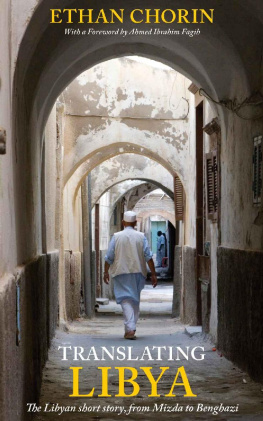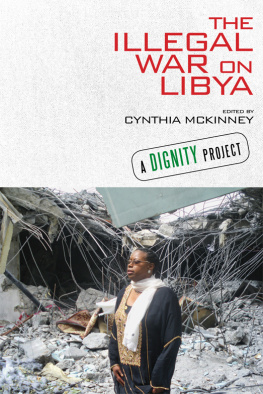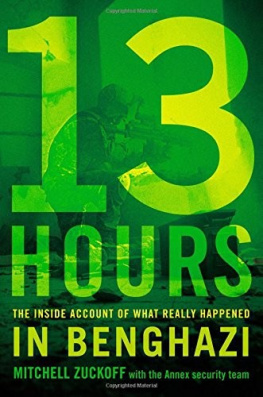Ethan Chorin - Translating Libya: Chasing the Libyan Short Story, from Mizda to Benghazi
Here you can read online Ethan Chorin - Translating Libya: Chasing the Libyan Short Story, from Mizda to Benghazi full text of the book (entire story) in english for free. Download pdf and epub, get meaning, cover and reviews about this ebook. year: 2014, publisher: Ethan Chorin, genre: Detective and thriller. Description of the work, (preface) as well as reviews are available. Best literature library LitArk.com created for fans of good reading and offers a wide selection of genres:
Romance novel
Science fiction
Adventure
Detective
Science
History
Home and family
Prose
Art
Politics
Computer
Non-fiction
Religion
Business
Children
Humor
Choose a favorite category and find really read worthwhile books. Enjoy immersion in the world of imagination, feel the emotions of the characters or learn something new for yourself, make an fascinating discovery.
- Book:Translating Libya: Chasing the Libyan Short Story, from Mizda to Benghazi
- Author:
- Publisher:Ethan Chorin
- Genre:
- Year:2014
- Rating:3 / 5
- Favourites:Add to favourites
- Your mark:
- 60
- 1
- 2
- 3
- 4
- 5
Translating Libya: Chasing the Libyan Short Story, from Mizda to Benghazi: summary, description and annotation
We offer to read an annotation, description, summary or preface (depends on what the author of the book "Translating Libya: Chasing the Libyan Short Story, from Mizda to Benghazi" wrote himself). If you haven't found the necessary information about the book — write in the comments, we will try to find it.
Ethan Chorin: author's other books
Who wrote Translating Libya: Chasing the Libyan Short Story, from Mizda to Benghazi? Find out the surname, the name of the author of the book and a list of all author's works by series.
Translating Libya: Chasing the Libyan Short Story, from Mizda to Benghazi — read online for free the complete book (whole text) full work
Below is the text of the book, divided by pages. System saving the place of the last page read, allows you to conveniently read the book "Translating Libya: Chasing the Libyan Short Story, from Mizda to Benghazi" online for free, without having to search again every time where you left off. Put a bookmark, and you can go to the page where you finished reading at any time.
Font size:
Interval:
Bookmark:
Table of Contents
Translating Libya
The Modern Libyan Short Story
From Mizda to Benghazi
By Ethan Chorin
Copyright 2014 Ethan Chorin
ISBN: 978-0-9903766-6-8
Cover design by Jennifer de Camp
Cover photo by Charles Cecil
Foreword
by Ahmed Ibrahim Fagih
I was very pleased when Ethan Chorin asked me to write the foreword to the second edition of Translating Libya . Chorin first approached me in 2006 for permission to include his translation of my short story The Locusts ( Al Jarad ), in a collection of work from 15 Libyan authors. I was then happy for the interest of this American diplomat in Libyan literature, but had no idea of the scope of the project, or where it would lead. When I saw the final product, I was surprised at how well the book as a whole managed to capture the essence of the modern Libyan Short story, and some fundamental cultural and social truths.
At the time of writing, Translating Libya is one of the few, if not the only, multi-author anthology of Libyan Short stories in English, and the only book of its kind written by a non-Libyan. While Translating Libya is not widely available in Libya (is but one sad legacy of the previous regime that very few Libyans today are accustomed to reading fiction), the book is known to a large number of Libyan intellectuals, and politicians and writers. This speaks to the impression the first edition has made, and the indirect value it has had in cementing U.S.-Libya relations.
Libya passed through two significant transformations in the last decade: the opening to the West, which lasted roughly from 2003 to 2010, and then the subsequent 17 th of February Revolution and its aftermath, from early 2011 to present, in which the Libyan people toppled the 41-year rule of Colonel Qadhafi and then, set about establishing a new one, if so far imperfectly. There are not many Westerners who can claim to have stood with Libya at both sides of the line dividing Qadhafis Libya and Post Qadhafi Libya, or been in a position to draw a connection between the two. There are even fewer who have paid much attention to the impact of these events on Libyan culture, or vice versa. This is one of the attributes of Translating Libya .
Translating Libya is like a time capsule in which, one can trace the above transformations, and understand that they were not completely conscious. Compare, for example, the morbid resignation of Abdel Raziq Al-Mansuris character in, My Dead Friends ( Asdiqa Al-Mawti ), which was written before the opening with the West, with the more proactive approach of the protagonist in Lamia El Makkis Tripoli Story ( Hekaya Trabulsia ). Writing in 2006, El Makki describes the impact of the new commercial culture in Tripoli, and its impact on traditional relationships. While new stories might have distracted from the main point of Translating Libya , something more was needed by way of explanation, to put the stories in current context. I think Chorin does this very ably in his new introduction.
***
Translating Libya is an expression of Libyan culture, but also an exquisite lesson in how writers communicate when they live under a repressive regime, which engages in heavy censorship and random, severe punishment. The stories reflect society as it was, and is, and even give voice to the sufferings of the dictator himselfdescribing the psychic consequences to the oppressor of living in constant tension with the people. It was none other than Sadiq Neihoum, many years ago a companion of colonel Qadhafi, who was able to depict the agonies suffered by the dictator, in An Markab Assultan (the Sultans Flotilla).
A writer of a great talent, as Neihoum was, is ultimately only able to follow his conscience, and write what his free spirit dictatednot what the Sultan (understood by every Libyan who read the story to be Qadhafi) commanded. The Sultans Flotilla is nothing if not a clear-eyed prediction of Qadhafis demons, and what they would ultimately make of him. As Chorin notes, Neihoums books were almost contraband in Libyafor obvious reasonsbut the implicit criticism was tolerated by Qadhafi, as it is in other parts of the Middle East and the world, as long as the name of the ruler is not used, and the places distorted. Neihoum, for example, describes the town of Jalo, for example (and with great irony) as a seaside town, when in fact it is well known to be deep in Libyas Eastern desert.
***
The cleverness of Translating Libya lies in the fact that through the literary device usedinvestigating the places and people mentioned in this subset of Libyan short stories--Chorin was able to inform his readership about the broader culture and context in which the stories were written, without drawing undue public attention to the political undertones of the stories themselves, or their authors. Thus Translating Libya can at once be legitimately presented as apolitical stories of love and hardship (as per the subtitle of Susannah Tarboushs notable review in Al Qantara ) and yet they are, at the same time highly political. By focusing on the cultural and literary context that produced the stories, Chorin allowed the authors to publish social commentary for a wider audience with plausible deniability intact. Indeed, Chorins goal was to highlight the authors milieu, and to give the reader just enough information to make his own determination of what might be going on.
The premise of searching for place is doubly significant, as it gave Chorin a reason to visit the towns and sites mentioned in the piecessome of which, a visitor would have little reason to visit. Chorins snapshots of the rich geographical and cultural diversity of Libya are in many ways just as valuable as the stories themselves. Libya is an extremely large country (1,760,000 km), with a number of very different environments, colors and flavors. Libya encompasses rich coastal areas, oases, mountains; its people are Bedouin, urban dwellers and rural folk. The reader of this book will gain, both from the 16 stories and Chorins commentary, a sense of this geographical and cultural variation in Technicolor.
***
I think it is important to emphasize that the writers whose work is included in this book did not write as a simple diversion, they wrote with a great sense of commitment and purpose, and a very deep attachment to their culture and country. Their work is directly impacted by the social and political events in the countrywhether this is explicit, or not. How could it be any other way?
Take The Locusts. This was one of the first stories I wrote, back in the 1960s. It was inspired by a real event that took place in my hometown of Mizda, when I was a boy. The story was interpreted by a highly politicized Arab community as a literary innovation, the use of the people as literary protagonists and a commentary on foreign occupation, which had ended in Libya several years before.
In fact, when I wrote The Locusts, I was not thinking in such terms, at least not consciously. But this is the condition a writer finds himself in, without being able to escape. Libya experienced a highly troubled colonial past, a heroic resistance against Italian occupation, a long period of repressive dictatorship, and all the attendant sufferings and hardships. When I started to write in the early 1950s, Libya was considered one of the poorest countries in the world. Only 5% of the population was literate. How could I, or any other Libyan writer, have been able to write unaffected by the suffering of his friends and relatives and neighbors, to focus solely on perfecting literary turns of phrase?
***
At the time of writing, Libya is undergoing a period of tremendous turmoil. For all practical purposes law and order in many places is absent. Everyone in Libya at one point or other since February, 2011, has been forced to confront the dark question: was freedom worth the costs associated with the current harsh reality? What is freedom, exactly? The individuals answer of course depends: it depends on his or her position under the previous regime, and it depends, practically, on the future. Libyas past provides evidence of similar periods of fragmentation and chaos, and re-integration, which suggests that indeed, Libya will not become another Somalia. The key is to make sure that the processes established now, incorporate past and recent experiences, so that we do not repeat the same old stories.
Next pageFont size:
Interval:
Bookmark:
Similar books «Translating Libya: Chasing the Libyan Short Story, from Mizda to Benghazi»
Look at similar books to Translating Libya: Chasing the Libyan Short Story, from Mizda to Benghazi. We have selected literature similar in name and meaning in the hope of providing readers with more options to find new, interesting, not yet read works.
Discussion, reviews of the book Translating Libya: Chasing the Libyan Short Story, from Mizda to Benghazi and just readers' own opinions. Leave your comments, write what you think about the work, its meaning or the main characters. Specify what exactly you liked and what you didn't like, and why you think so.






